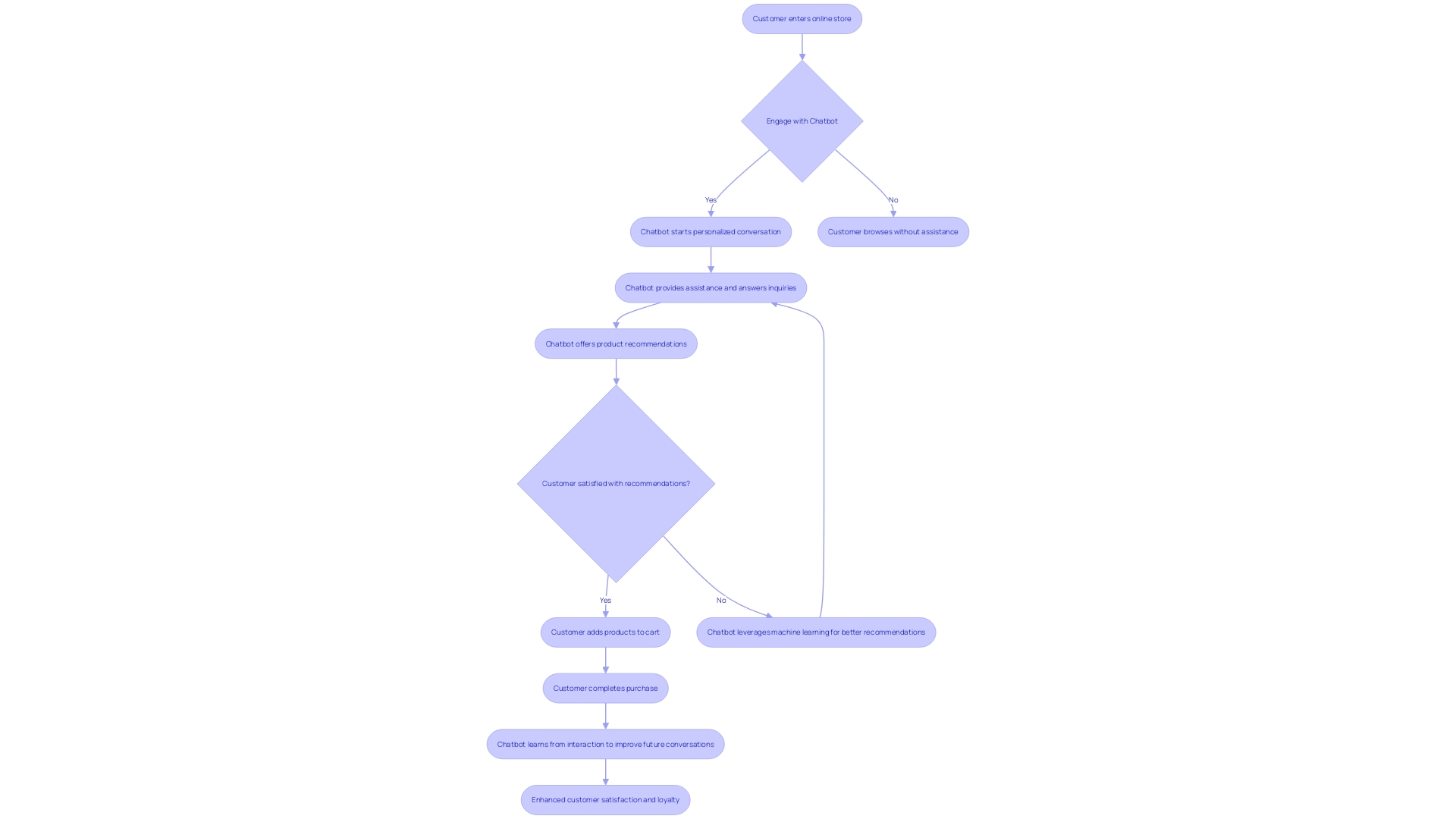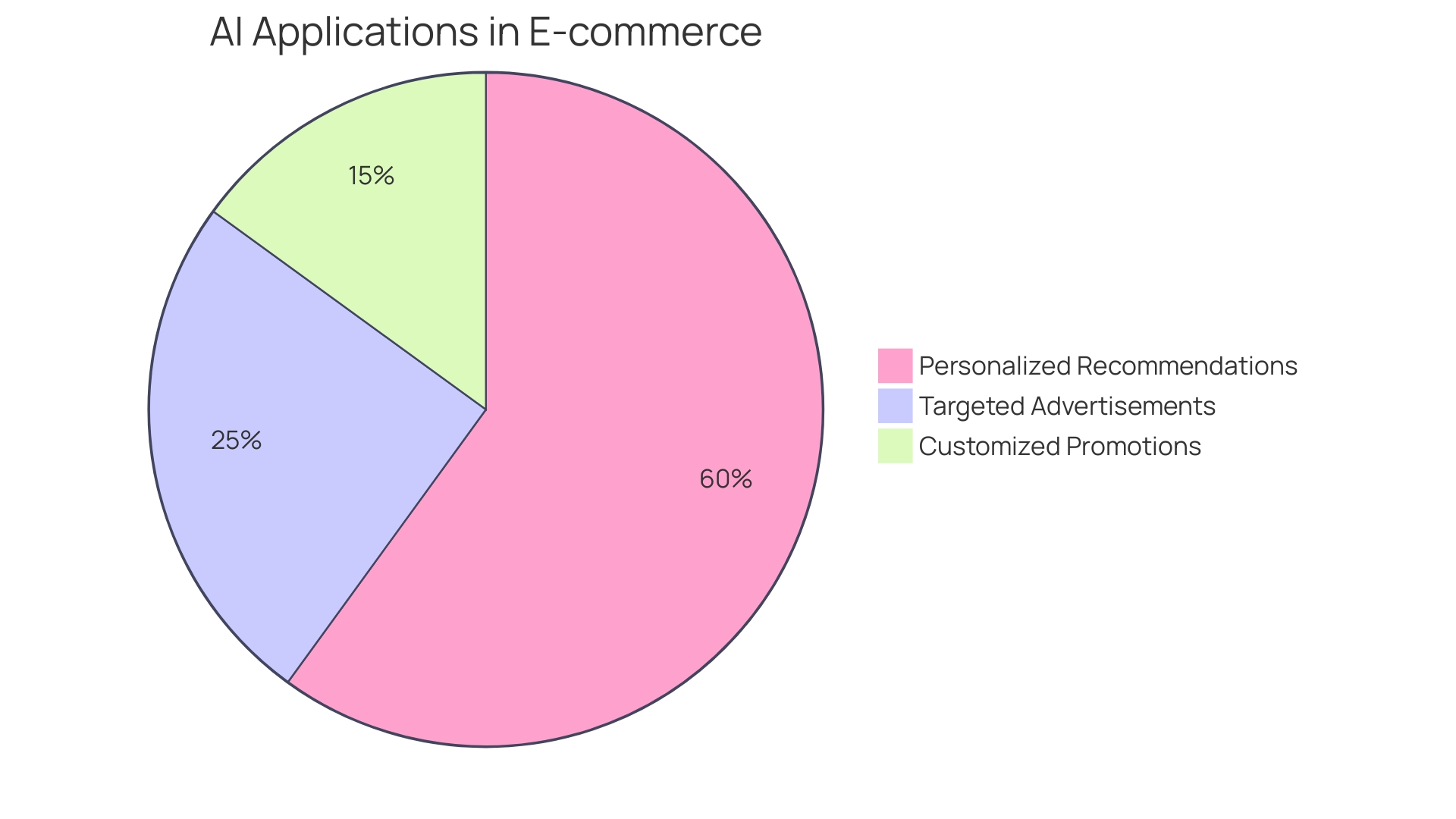Introduction
The advent of Artificial Intelligence (AI) within the e-commerce landscape has revolutionized the way consumers shop online. AI-powered machine learning algorithms have the capacity to sift through and analyze copious amounts of customer data, allowing businesses to discern individual consumer preferences, behaviors, and previous purchase patterns.
This article explores the various applications of AI in e-commerce, including personalization, predictive analytics, segmentation, sentiment analysis, image and voice recognition, chatbots, fraud detection, talent development, and strategic partnerships. By harnessing the power of machine learning, companies can create personalized shopping experiences that resonate with each individual customer, leading to increased customer satisfaction and sales.
Personalization: Tailoring Customer Experiences
The advent of Artificial Intelligence (AI) within the e-commerce landscape has revolutionized the way consumers shop online. AI-powered machine learning algorithms have the capacity to sift through and analyze copious amounts of customer data. This analysis allows businesses to discern individual consumer preferences, behaviors, and previous purchase patterns.
By harnessing this data, companies can craft personalized product recommendations and targeted promotional campaigns, which resonate on a more personal level with each customer. The essence of this approach is to curate a shopping experience that is meticulously tailored to the preferences and interests of each individual, leading to heightened customer satisfaction and, in turn, an increase in sales. AI in e-commerce serves as a bridge between operational efficiency for sellers and enhanced shopping satisfaction for buyers, marking a pivotal shift in the online marketplace.
Predictive Analytics: Forecasting User Behavior
Predictive analytics, harnessing the power of historical and real-time data, is revolutionizing personalized shopping experiences. This technique employs statistical algorithms and machine learning to discern patterns within the data, projecting future consumer behavior with a certain level of probability. It's not about crystal-clear forecasts; rather, it gauges the likelihood of different outcomes, enhancing the decision-making process.
As fresh data flows in, predictive models undergo continuous refinement, sharpening the accuracy of future predictions. In the realm of marketing, this analytic approach is invaluable. It sifts through past purchases and digital footprints, enabling businesses to craft bespoke marketing strategies.
The impact? Heightened customer engagement and a surge in sales, as shoppers encounter product recommendations and promotions that resonate with their unique tastes and shopping history. By tapping into predictive analytics, companies can not only meet but anticipate customer needs, steering pricing and inventory strategies to align with emerging consumer trends for a truly seamless shopping journey.
Segmentation: Identifying Target Audiences
The explosion of data in recent years, with a staggering 90% generated in just the previous twelve months as of early 2016, presents a formidable challenge for businesses. Traditional database systems and marketing automation tools struggle to harness this deluge, often failing to unlock deep insights or suggest proactive measures. Yet, this is where machine learning algorithms excel, processing vast customer databases and clickstream data to uncover patterns and preferences.
By understanding customer journeys across websites, machine learning not only segments audiences but also informs targeted marketing campaigns with a precision that traditional methods cannot match. The result? Enhanced engagement, improved conversion rates, and heightened customer satisfaction.
Furthermore, the integration of AI into marketing transcends automation, entering the realm of augmentation. It empowers marketing teams with intelligent support, enriching complex tasks such as media planning and customer insight generation. Firms at the forefront of AI maturity are already experiencing the benefits of augmentation, gaining competitive advantages and fostering deeper customer loyalty through increased proximity and tailored interactions.
Sentiment Analysis: Understanding Customer Sentiments
Artificial Intelligence (AI) is transforming e-commerce by offering unprecedented personalization capabilities. Machine learning algorithms are now capable of dissecting vast datasets, such as customer reviews and social media interactions, to understand consumer sentiments. This technology goes beyond mere data analysis; it taps into the very pulse of customer preferences.
By employing sentiment analysis, e-commerce platforms can detect nuanced emotional responses, enabling them to respond to consumer needs with remarkable precision. The benefits of integrating AI into e-commerce are manifold. It allows for the creation of shopping experiences that resonate personally with each customer, potentially increasing loyalty and trust in the brand.
Cameron Furmidge, Head of Insights at Luzern eCommerce, emphasizes the challenge of securing customer loyalty in retail. He suggests that Ai's ability to combine technology with a human touch is instrumental in enticing customers to return. AI is not just about the efficiency of operations; it's about creating a shopping journey that feels familiar, intuitive, and tailored to the individual, reflecting their unique preferences and past interactions.
Image and Voice Recognition: Enhancing Customer Interactions
Machine learning is revolutionizing the retail industry by offering personalized shopping experiences through image and voice recognition technologies. These systems can identify potential threats and prevent theft by recognizing individuals with a criminal history, a technology previously exclusive to law enforcement but now instrumental in retail security.
Retailers can also leverage these capabilities to automate customer service tasks such as verifying identities and addressing basic order inquiries with phrases like "Where is my order?" This not only enhances customer convenience but also secures areas with sensitive information or valuable goods by restricting access to unauthorized individuals.
As Corsight AI suggests, the integration of Facial Intelligence technology in retail chains and malls demonstrates the growing trend of using real-time video analytics to improve security and customer service. This strategic application of machine learning ensures that employees and customers are protected while offering a seamless and intuitive shopping experience. By focusing on these practical and impactful use cases, businesses can achieve a significant return on investment without the need for complex, cutting-edge solutions.
Chatbots: Providing Personalized Conversations
Expert Advice: Chatbots are becoming increasingly popular in the realm of personalized shopping experiences. Powered by machine learning, chatbots can engage in personalized conversations with customers, providing assistance, answering inquiries, and offering product recommendations.
By leveraging machine learning algorithms, chatbots can learn from customer interactions and continuously improve their responses. This allows businesses to provide a personalized and efficient customer service experience, enhancing customer satisfaction and loyalty.

Fraud Detection: Ensuring Secure Transactions
Machine learning (ML) is revolutionizing the way businesses tackle the pervasive challenge of credit card fraud, which has escalated into a pressing issue costing billions annually. As traditional fraud detection methods fall behind in the race against increasingly cunning fraudsters, ML emerges as a formidable weapon in the commercial arsenal.
Employing sophisticated algorithms, ML scrutinizes vast datasets, including transaction histories and customer behaviors, to unearth irregularities and suspicious patterns indicative of fraudulent activities. The agility of ML in fraud detection lies in its capacity to adapt and learn from new data, thereby enhancing its ability to thwart fraud attempts in a dynamic environment.
This proactive approach not only curtails the incidence of fraud but also fortifies consumer trust by safeguarding their transactions against illicit exploits. According to findings from Ravelin's research, as reported by Retail Technology Review, a staggering 40% of internet shoppers have committed fraud in the past year, with the over-45 demographic being the most prevalent culprits. This underscores the urgency for businesses to deploy advanced ML-driven fraud detection systems to provide a secure e-commerce ecosystem for shoppers across all age groups.
Developing an Appropriate Talent Pool for Machine Learning
To harness the transformative power of machine learning for personalized shopping experiences, assembling a team of experts is essential. Recruitment of data scientists, machine learning engineers, and AI specialists is a key step towards developing a sophisticated understanding of customer preferences. Wayfair's approach exemplifies this strategy; they employ machine learning to interpret vast product details, decoding attributes like color and shape from their extensive catalog of over 40 million items.
This level of analysis enables Wayfair to present the most relevant search results, such as pinpointing the perfect "modern yellow sofa" for their customers from thousands of options. Similarly, businesses can benefit from nurturing their existing workforce's skills, empowering them to contribute to the machine learning initiatives. With the right talent onboard, companies are well-positioned to leverage machine learning technologies to curate shopping experiences that resonate with individual customer desires.
Establishing Partnerships for Innovation and Growth
The digital commerce landscape is rapidly transforming, with the lines between online and offline shopping experiences becoming increasingly blurred. In this dynamic environment, the key to staying ahead lies in harnessing the power of machine learning through strategic partnerships.
By collaborating with specialized technology providers, data analytics experts, and innovative AI startups, businesses can tap into a wealth of advanced tools and deep expertise. These alliances open doors to rich data sources and cutting-edge machine learning applications, enabling companies to offer finely-tuned, personalized shopping experiences.
As Charlotte Myles, BIC's eCommerce Director for Europe, pointed out, the depth of a company's success now depends on how effectively it can leverage consumer data. In a world where omnichannel strategies are evolving, the ability to extract, comprehend, and apply data insights is crucial. Establishing these partnerships is more than a growth strategy; it's a way to remain at the forefront of technological innovation and to craft shopping experiences that truly resonate with consumers.
Unlocking the Full Potential of Machine Learning in AI Marketing
The transformative power of AI in e-commerce is reshaping the shopping experience into a personalized journey tailored to each individual's preferences. With the integration of sophisticated machine learning algorithms, retailers are now equipped to mimic human intelligence processes, learning from vast data to offer suggestions that align with past purchases or searches.
The implementation of AI not only enhances the buyer's journey but also streamlines seller operations, making it a pivotal tool in the world of online shopping. These advanced technologies enable retailers to deliver targeted advertisements, individualized product recommendations, and customized promotions, optimizing marketing efforts for increased engagement and conversion rates. The benefits of adopting AI in e-commerce are evident, with a clear impact on the bottom line, fostering a shopping environment that feels intuitive and bespoke for every customer.

Conclusion
In conclusion, AI has revolutionized e-commerce by enabling businesses to personalize shopping experiences based on individual preferences. Through machine learning algorithms, companies can analyze vast amounts of customer data and make personalized product recommendations and targeted campaigns, leading to increased satisfaction and sales. Predictive analytics allows businesses to forecast consumer behavior and refine marketing strategies for better decision-making.
Segmentation helps identify patterns and preferences, enhancing engagement and conversion rates. Sentiment analysis enables a deeper understanding of customer sentiments, leading to personalized experiences that foster loyalty and trust. AI-powered image and voice recognition technologies enhance customer interactions and automate tasks, ensuring convenience and security.
Chatbots engage in personalized conversations, providing assistance and recommendations. Fraud detection systems powered by AI detect irregularities and protect against fraudulent activities, creating a secure e-commerce environment. To fully leverage the power of AI in e-commerce, assembling a team of experts is crucial.
Recruitment of data scientists, machine learning engineers, and AI specialists can help businesses gain a sophisticated understanding of customer preferences. Strategic partnerships with specialized technology providers, data analytics experts, and innovative AI startups are essential for staying ahead in the dynamic digital commerce landscape. These partnerships offer access to advanced tools and expertise that enable businesses to provide finely-tuned personalized shopping experiences.
Overall, the integration of AI in e-commerce reshapes the shopping experience into a personalized journey tailored to each individual's preferences. It optimizes marketing efforts, streamlines operations, and creates an intuitive environment for every customer. By adopting AI in e-commerce, businesses can drive sales growth, increase customer satisfaction, and thrive in the competitive online marketplace.





